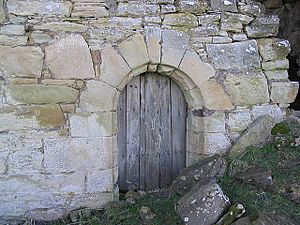Timpendean Tower facts for kids
Timpendean Tower (say "tim-pen-deen"), also known as Typenden Castle long ago, is a old ruined building from the 1400s. It's a type of strong home called a tower house. You can find it near Lanton, about 2.4 kilometers (1.5 miles) north-west of Jedburgh in the Scottish Borders area of Scotland.
Contents
History of Timpendean Tower
Timpendean Tower was built on high ground between two rivers, the River Teviot and the Jed Water. It's a simple, strong tower that measures about 8.8 meters (29 feet) by 7.3 meters (24 feet). The walls are very thick, about 1.2 meters (4 feet) wide! This tower was a strong base for the important Douglas family. Today, it is a protected historical site called a scheduled monument.
Who Owned Timpendean Tower?
The land where Timpendean Tower stands was once part of the Bonjedward estate. For a very long time, the Douglas family owned this land, passing it down from father to son. But in 1843, George, the 12th owner from Timpendean, sold it. The Scott family, who were farmers in Bonjedward, bought it then.
When Was the Tower Attacked?
Timpendean Tower faced a tough time in 1545. It was burned by soldiers working for the Earl of Hertford. This happened during a conflict known as the War of the Rough Wooing.
What Was Inside the Tower?
The tower itself had three floors and a strong, arched cellar underground. It seems there was another part of the building connected to it once, but that part is now gone. You can still see special bond stones sticking out on two of the walls, which shows where the extra section used to be. The door on the east side and a fireplace in the basement were added later, after the tower was first built.
Tower Floors and Defense
The first floor of Timpendean Tower held the great hall. This was likely a big room used for gatherings and meals. The second floor was where people slept. To get to these floors, people used a round staircase built into the east wall. For extra protection, part of the old earthworks (old defensive mounds around the tower) was blocked off. This area was then filled with water to create a defensive barrier.
See also
 In Spanish: Torre Timpendean para niños
In Spanish: Torre Timpendean para niños
 | Janet Taylor Pickett |
 | Synthia Saint James |
 | Howardena Pindell |
 | Faith Ringgold |


